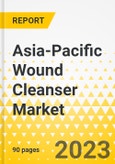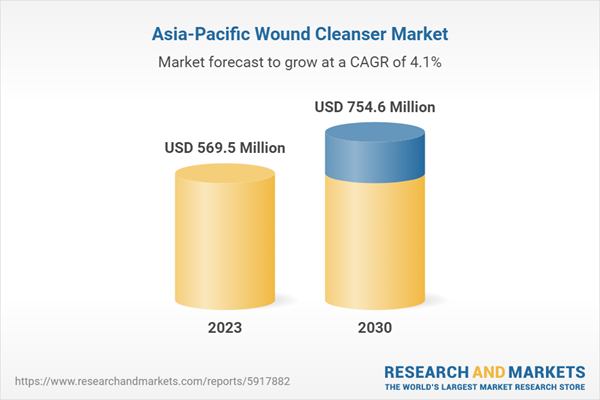Introduction to Asia-Pacific (APAC) Wound Cleanser Market
The Asia-Pacific wound cleanser market was valued at $547.4 million in 2022 and is expected to reach $754.6 million by 2030, growing at a CAGR of 4.10% during the forecast period 2023-2030. The key factors driving the growth of the global wound cleanser market include an increase in the prevalence of chronic disease, which leads to increased use of wound cleansers, an increase in the number of surgical and trauma cases, an increase in the acceptance and utilization of wound cleanser products, an increase in the prevalence of wound infections, and an increase in the number of specialty wound care clinics, which creates a demand for advanced wound care products.Market Introduction
A wound cleanser is a fluid or substance that cleans and irrigates wounds. It is used to promote appropriate wound healing, prevent infection, and maintain overall wound hygiene as part of wound care management. The wound cleanser market includes items that are used to clean and disinfect wounds. Typically, these products are used to clean and prepare wounds for future medical care, such as dressing application or suturing. The wound cleanser market encompasses a wide range of products meant to remove dirt, bacteria, and other impurities from wounds in order to enhance healing and reduce infection risk.Market Segmentation:
Segmentation 1: by Product
- Commercial Cleanser
- Saline
Segmentation 2: by Country
- China
- Japan
- India
- Australia
- South Korea
- Thailand
- Malaysia
- Rest-of-Asia-Pacific
How can this report add value to an organization?
Product/Innovation Strategy: The Asia-Pacific wound cleanser market has been extensively segmented based on various categories, such as product and country. This can help readers get a clear overview of which segments account for the largest share and which ones are well-positioned to grow in the coming years.Growth/Marketing Strategy: The wound cleanser market is growing at a significant pace and holds enormous opportunities for market players. Some of the strategies covered in this segment are product launches, partnerships, collaborations, business expansions, and investments. The companies' preferred strategy has been product launches, partnerships, and collaborations to strengthen their positions in the Asia-Pacific wound cleanser market.
This product will be delivered within 3-5 business days.
Table of Contents
Table Information
| Report Attribute | Details |
|---|---|
| No. of Pages | 90 |
| Published | December 2023 |
| Forecast Period | 2023 - 2030 |
| Estimated Market Value ( USD | $ 569.5 Million |
| Forecasted Market Value ( USD | $ 754.6 Million by 2030 |
| Compound Annual Growth Rate | 4.1% |
| Regions Covered | Asia Pacific |









